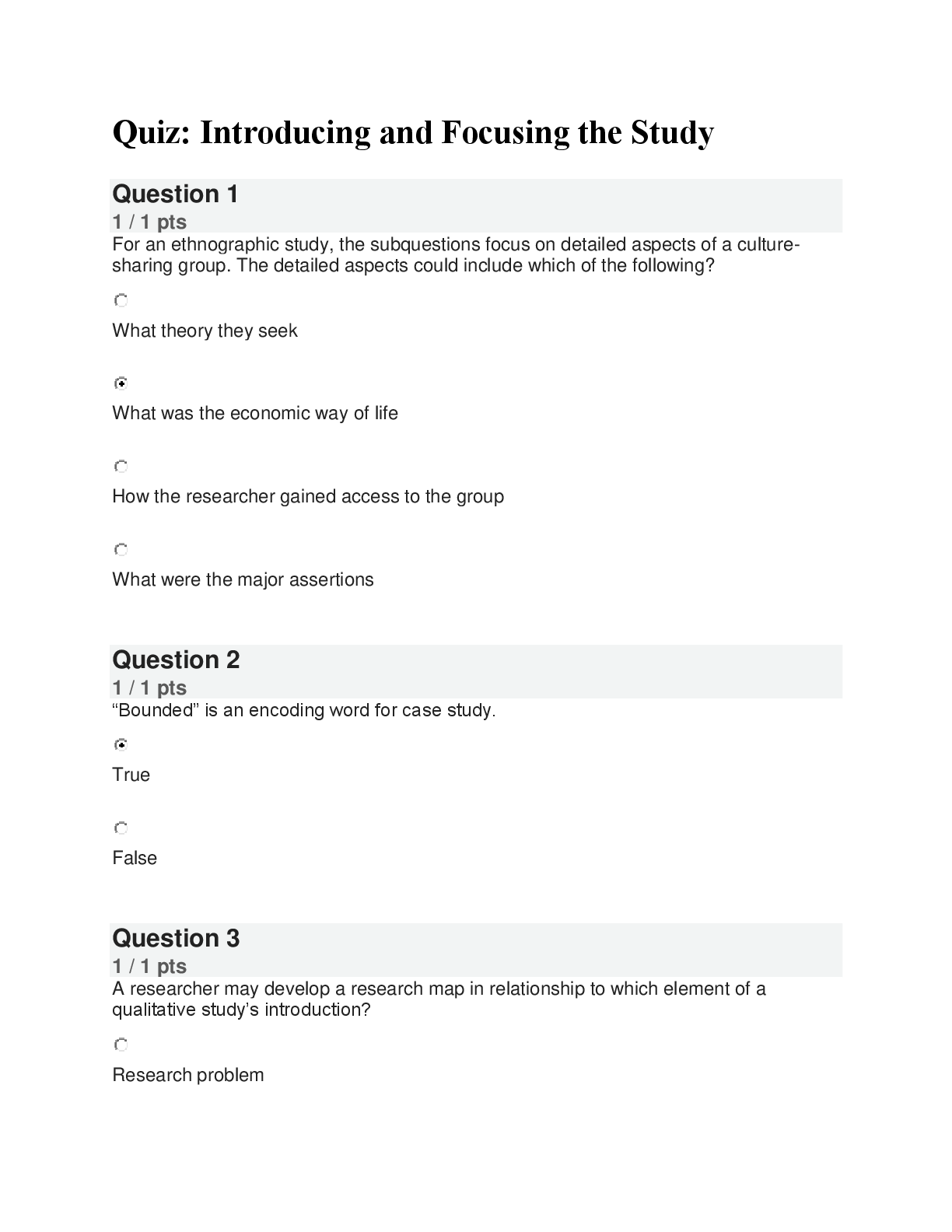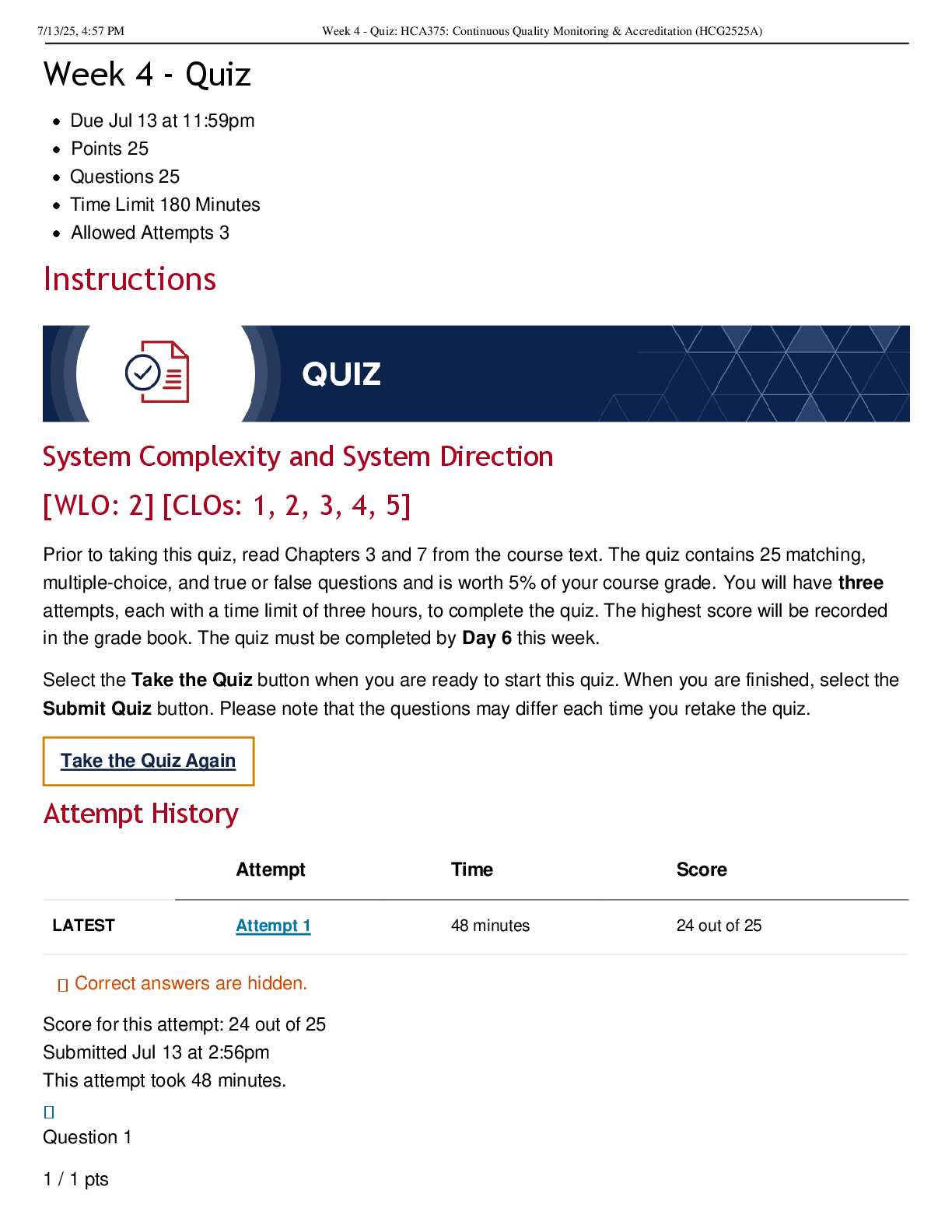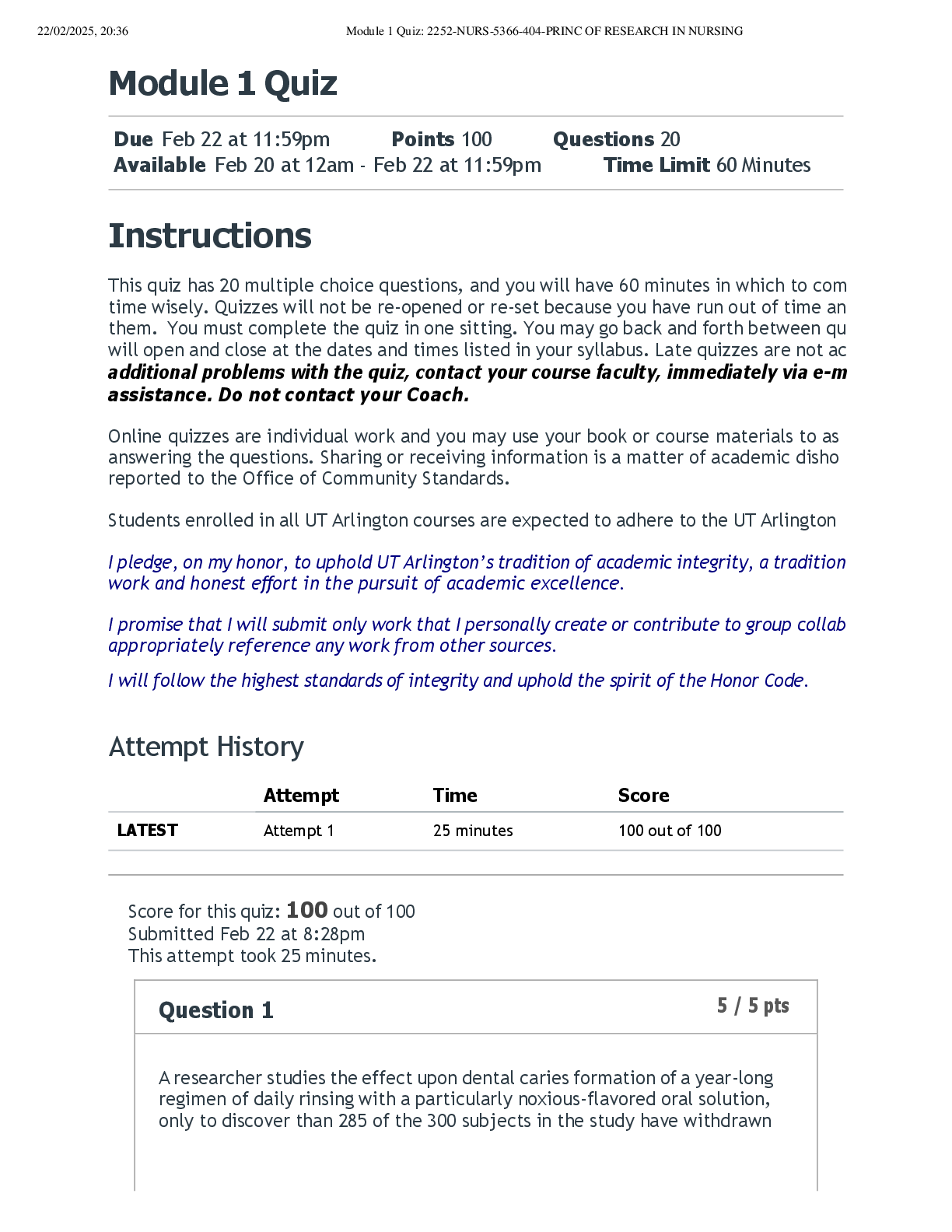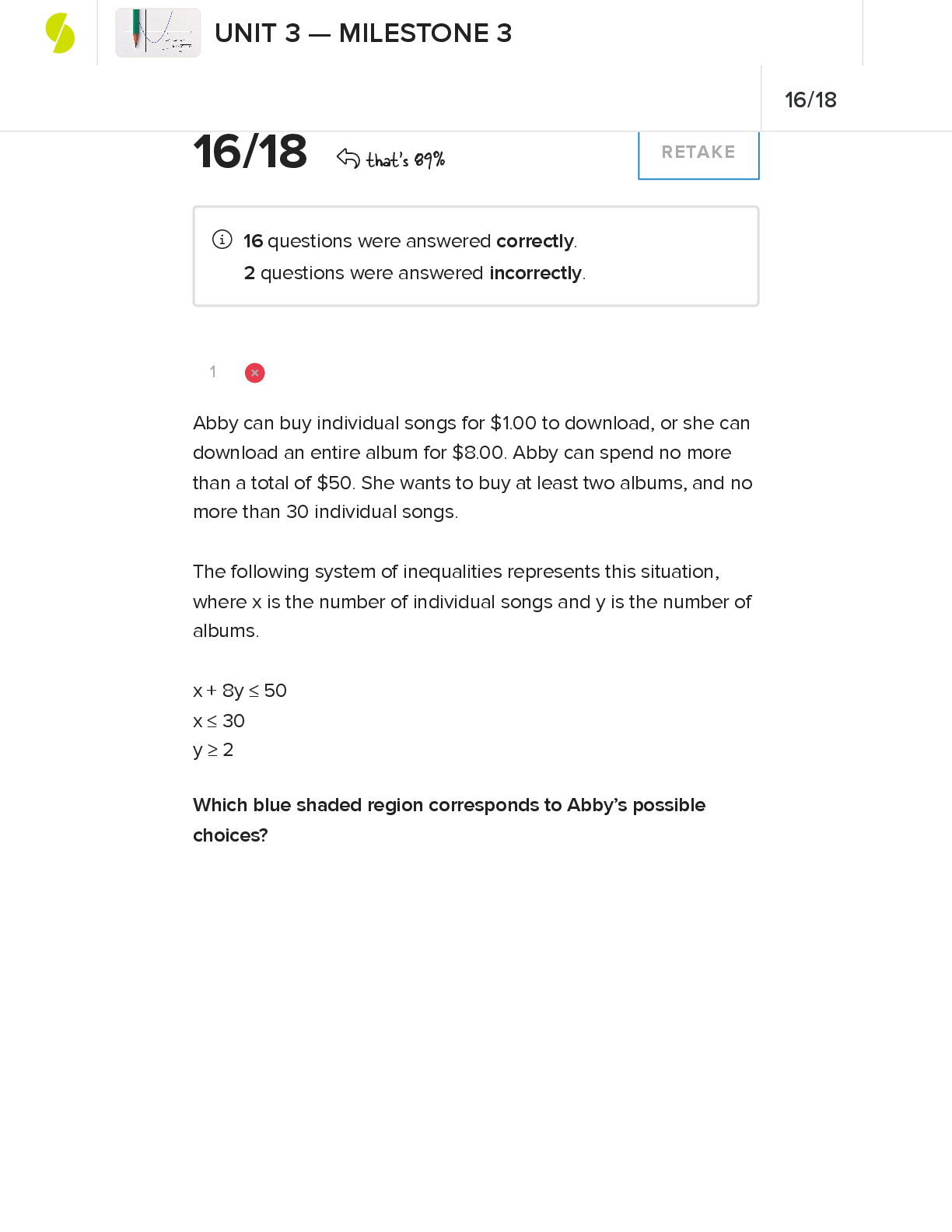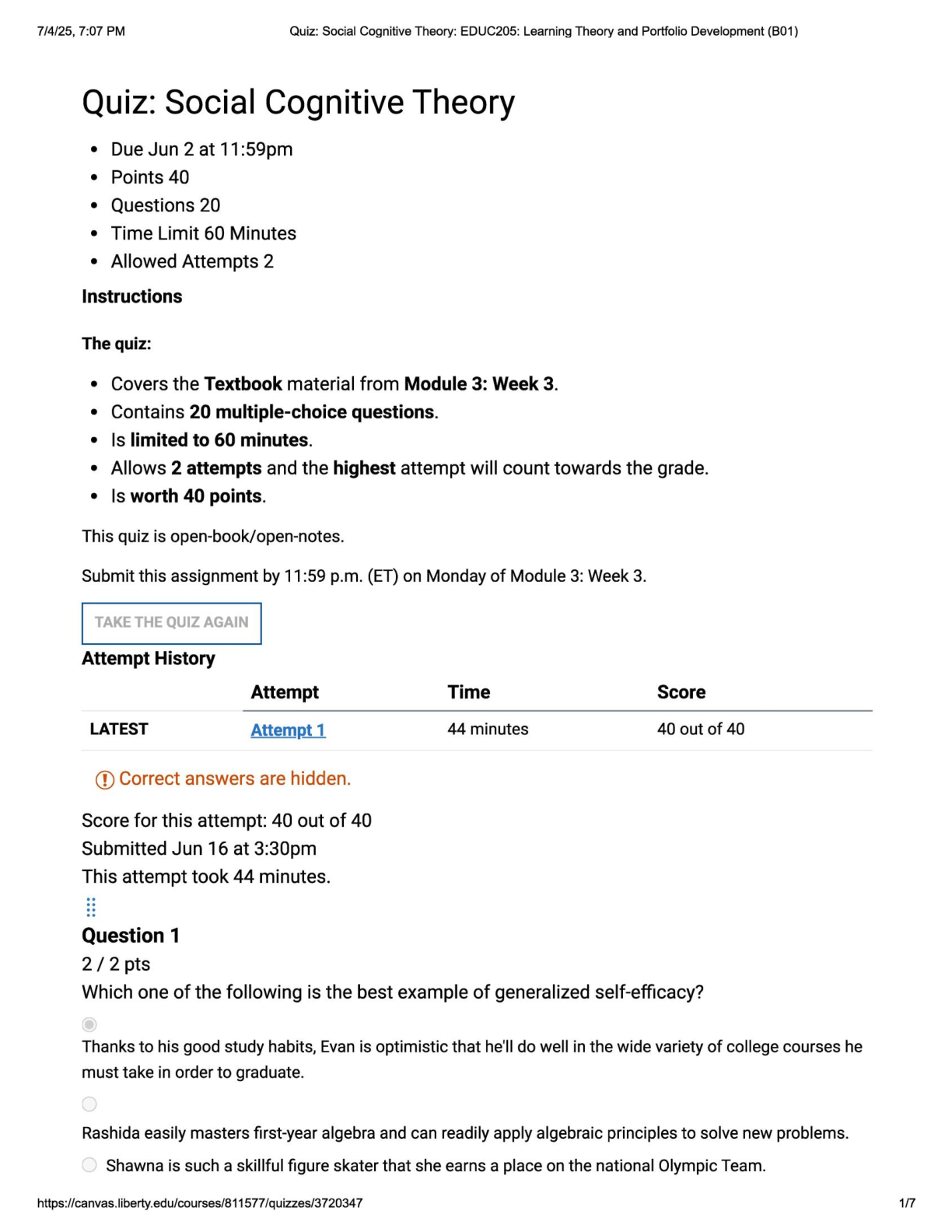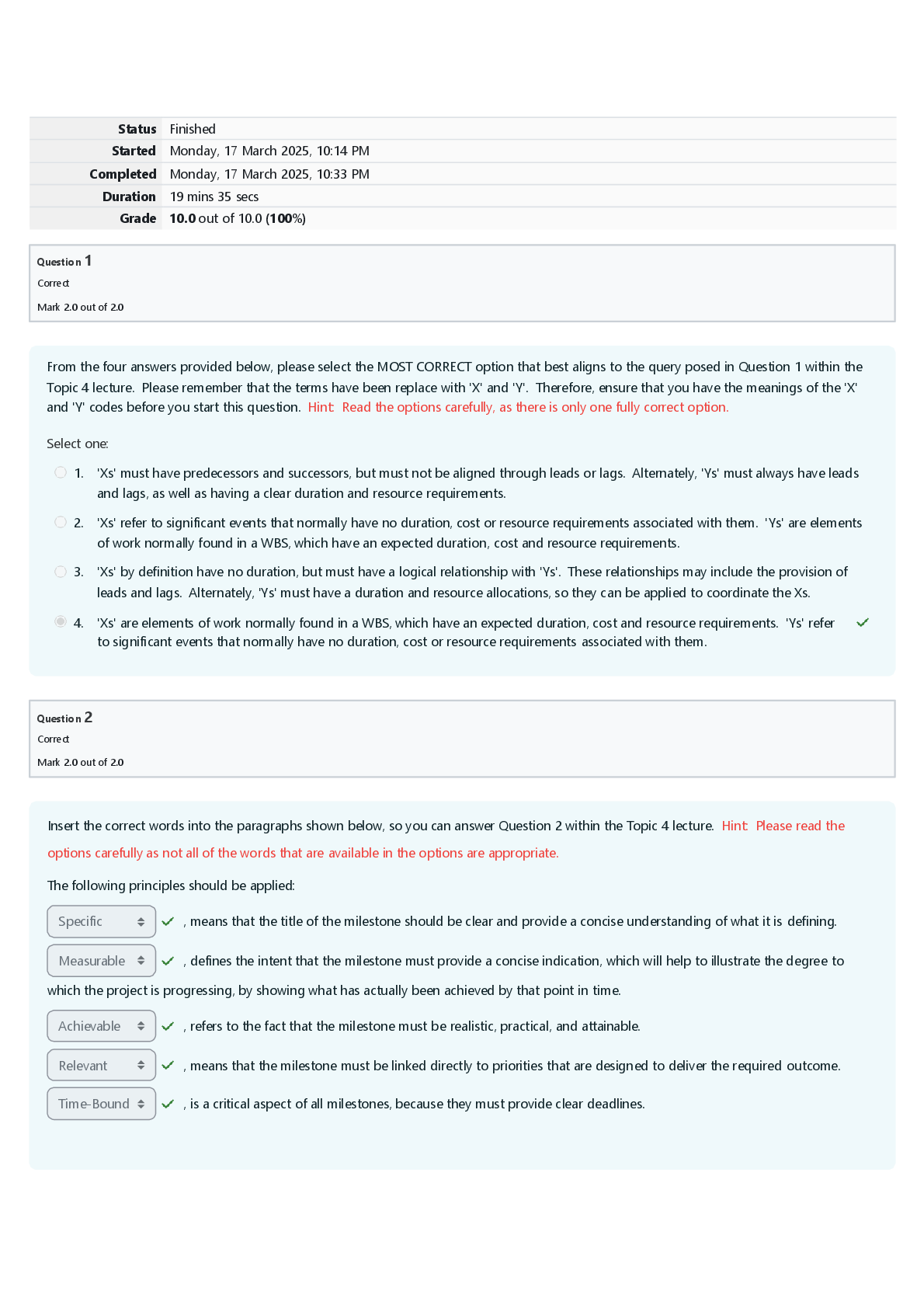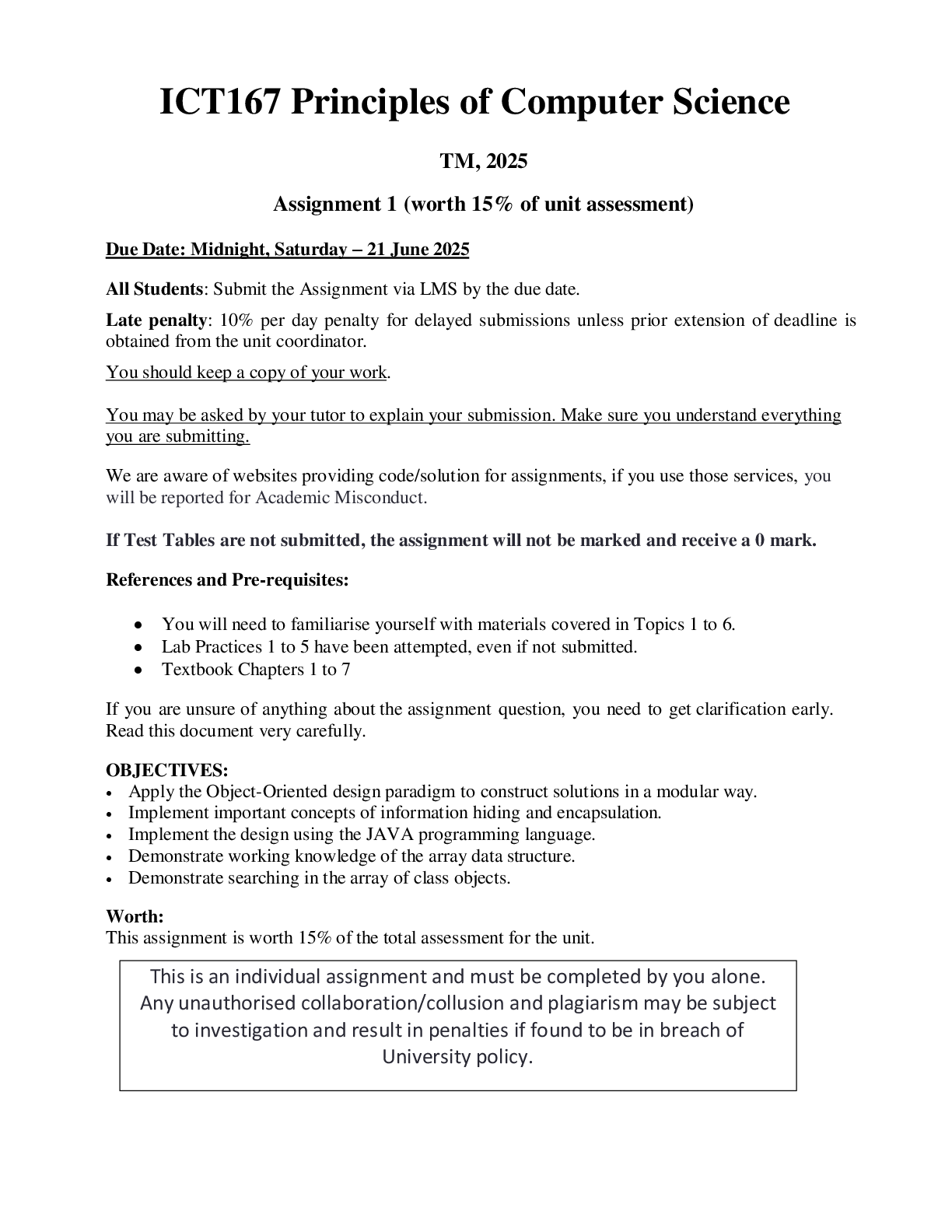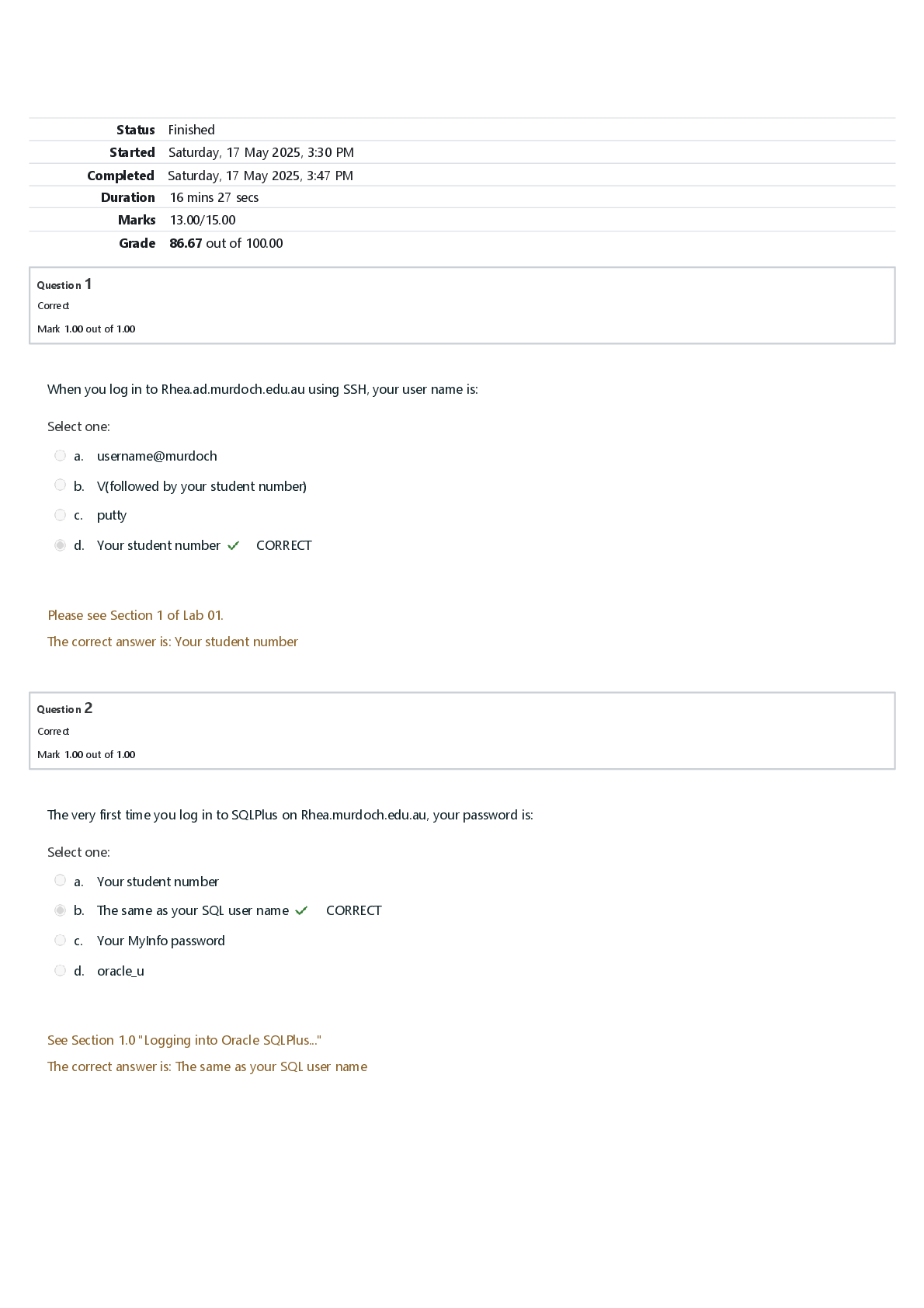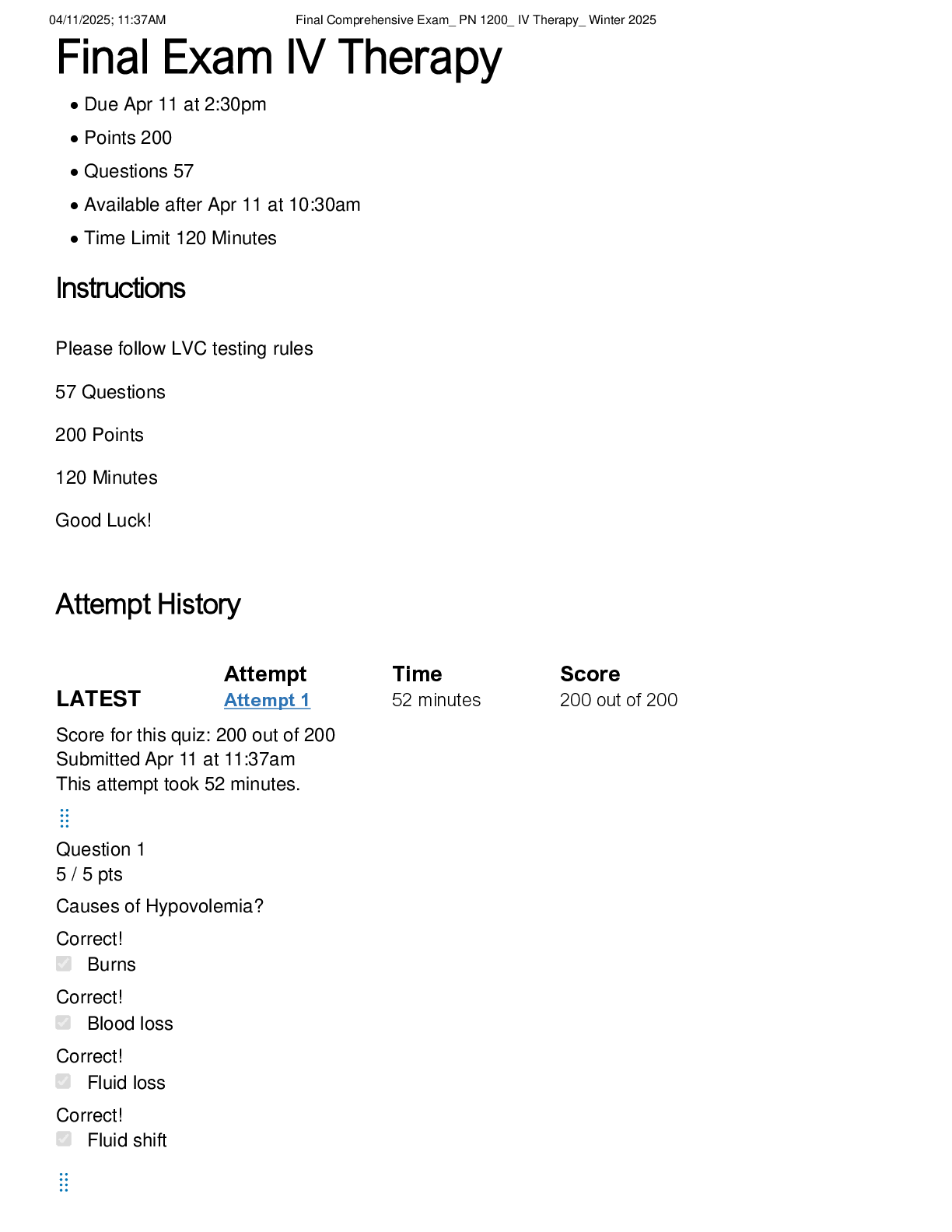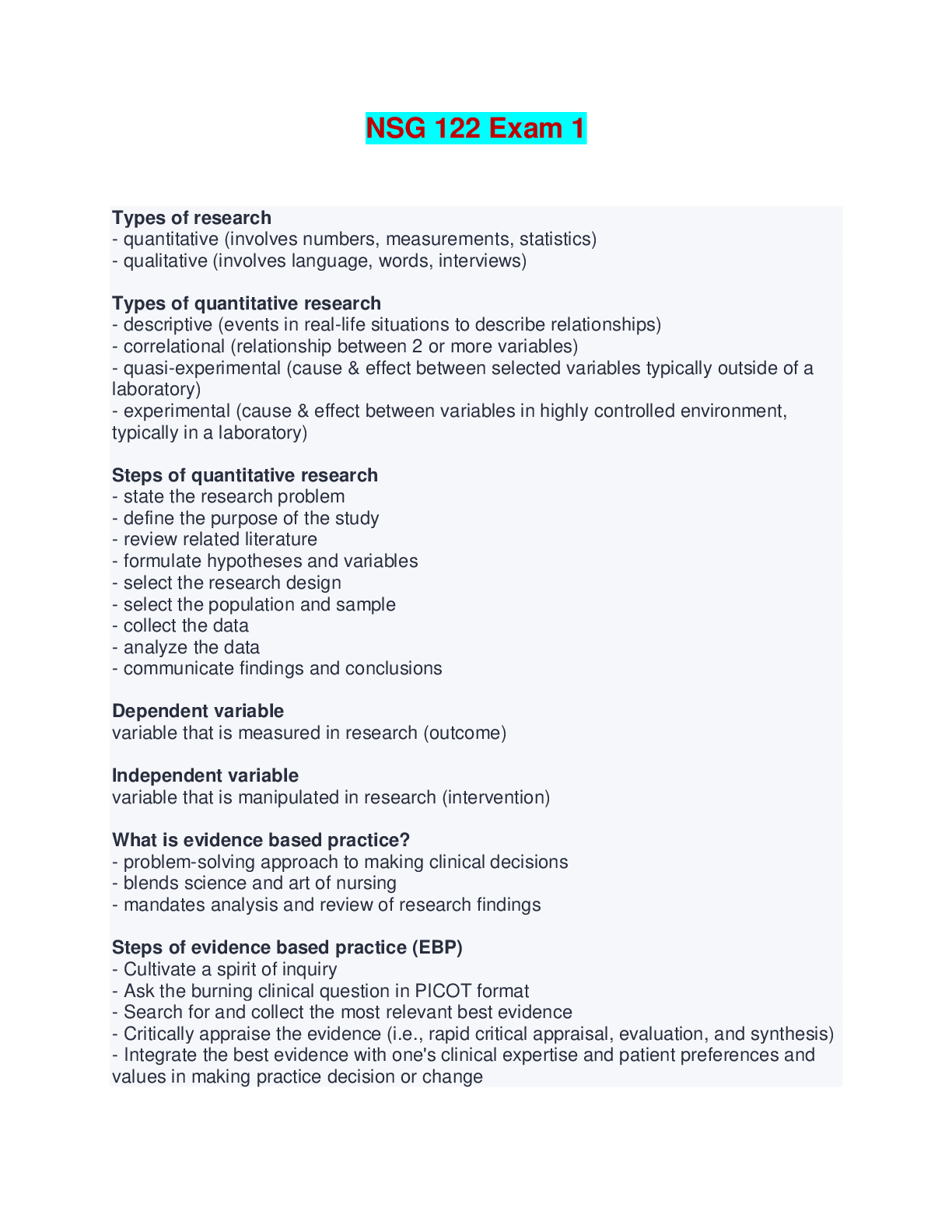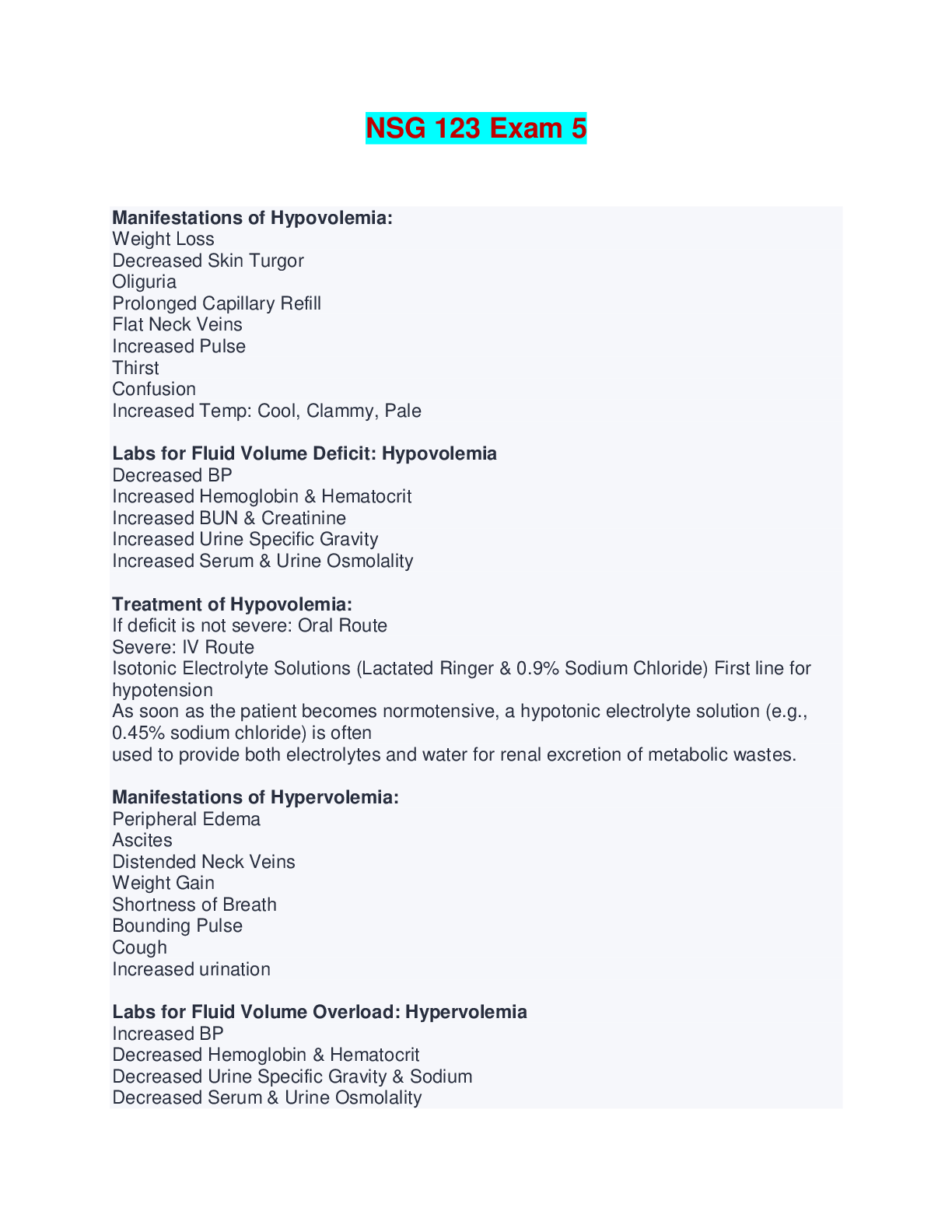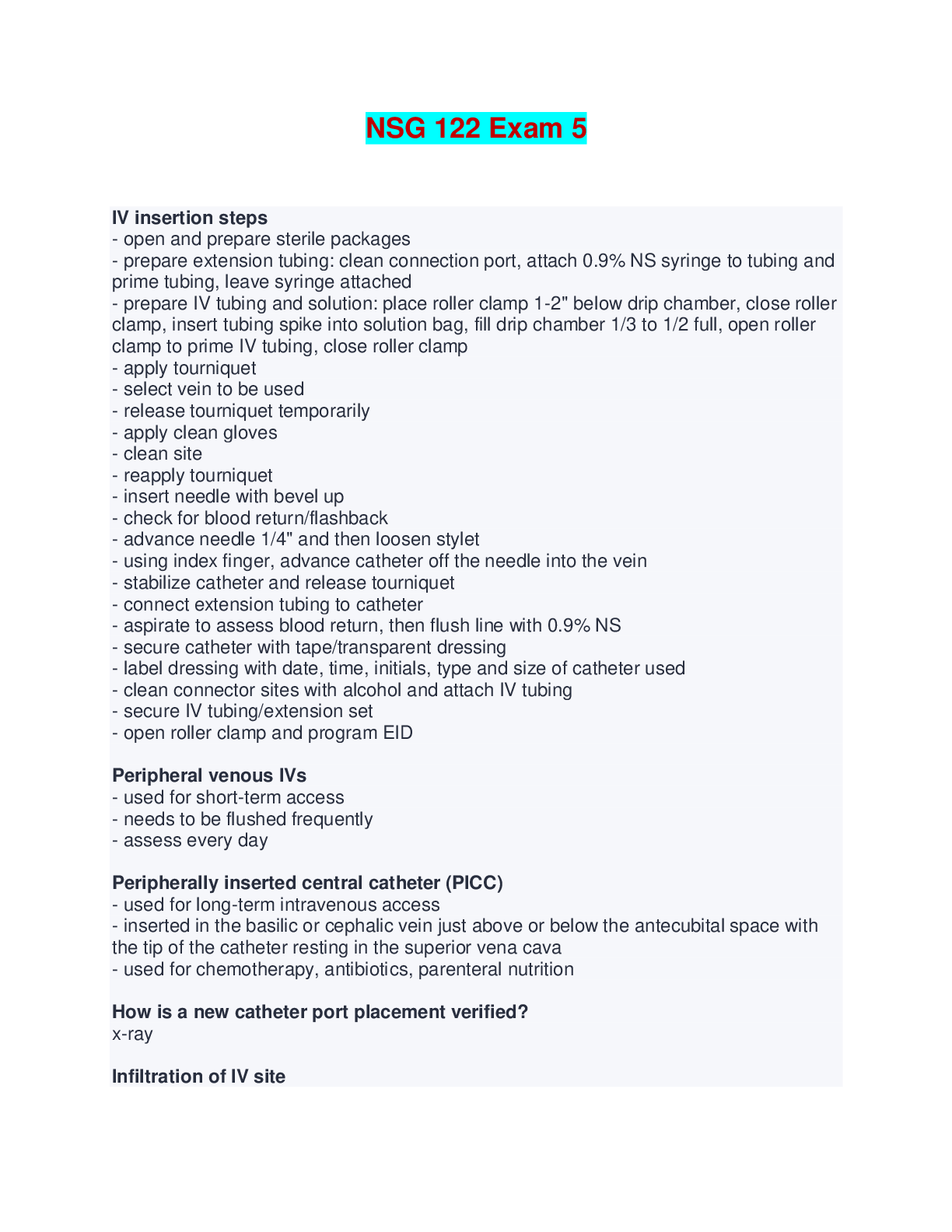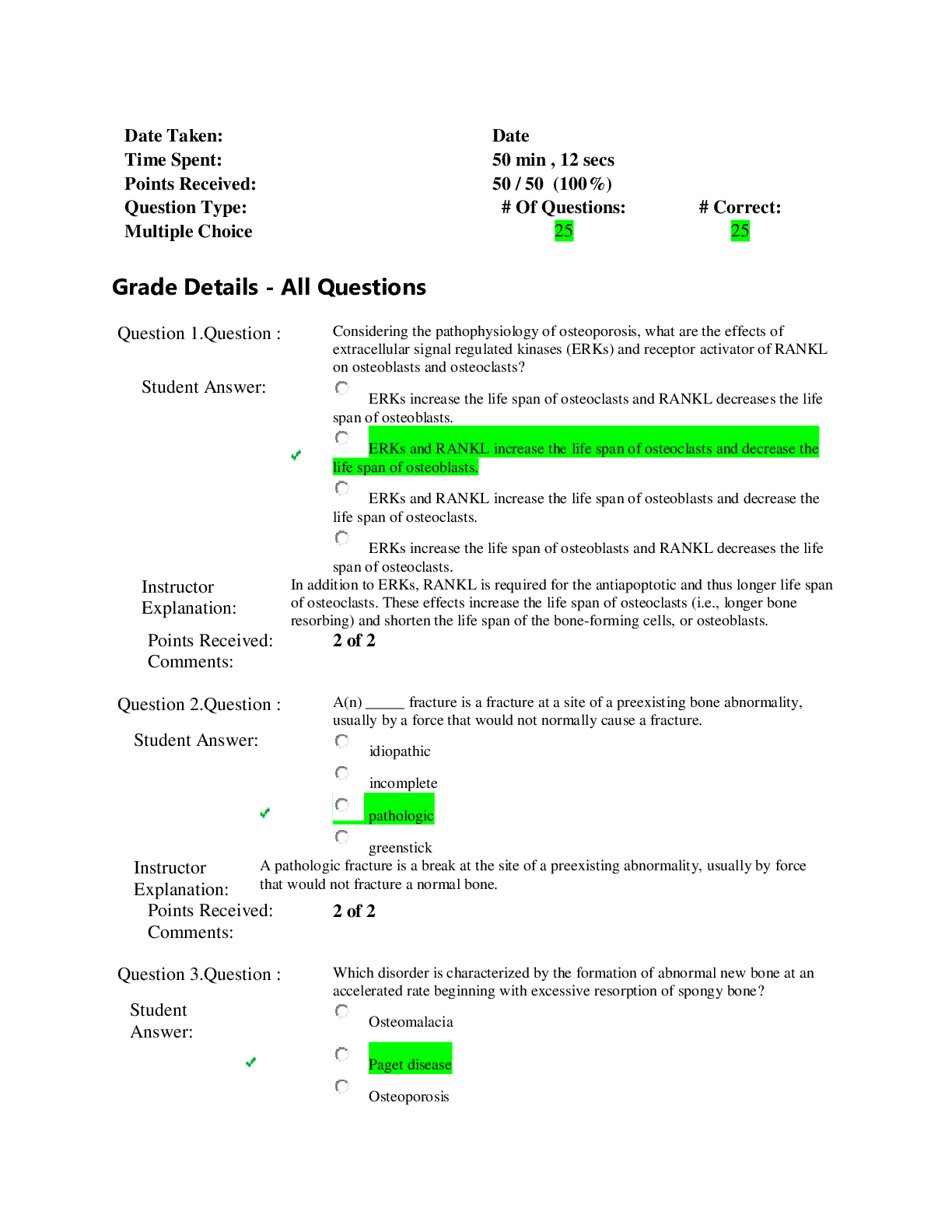*NURSING > EXAM > Chamberlain College of Nursing - ACCT 562 Week 4 Midterm Questions and Answers Rated A (All)
Chamberlain College of Nursing - ACCT 562 Week 4 Midterm Questions and Answers Rated A
Document Content and Description Below
Grade Details Page: 1 2 1. Question : (TCO D) The review team should be aware of various management and operational techniques, which includes all of the following except: Student Answer: TQM Be... nchmarking Mental Models Indexing Instructor Explanation: Reider Chapter 4 2. Question : (TCO F) Manually altering entries in an organization‘s books in order to conceal fraud is called: Student Answer: Fictitious reconstruction Shrinkage Forced reconciliation Padding the books Instructor Explanation: Wells, Chapter 9 3. Question : (TCO F) Which of the following is not one of the primary purposes of asking introductory questions during an interview? Student Answer: Establishing rapport between the interviewer and the subject Asking sensitive questions before the subject has the ability to go on the defensive Observing reactions to questions Establishing the theme of the interview Instructor Explanation: Wells, Chapter 15 4. Question : (TCO F) When the subject of an investigation has been accused of misconduct, establishing a morally acceptable rationalization might allow the accused to reconcile his actions with his conscience. Which of the following is not an example of an acceptable rationalization? Student Answer: The accused has been unfairly treated by his management. The accused is a bad person by nature. The accused felt that he needed to get back at someone in the organization. The accused engaged in the misconduct for the benefit of others. Instructor Explanation: Wells, Chapter 15 Points Received: 5 of 5 Comments: 5. Question : (TCO F) In one of the case studies in the Wells textbook (page 49), Brian Lee, a top-notch plastic surgeon, collected payments from his patients without giving a cut to the clinic where he practiced. How was he punished? Student Answer: Allowed to continue with the practice and make restitution. Terminated and required to make full restitution. Sued in civil court for the amount of loss. Convicted of larceny and sentenced to prison. Instructor Explanation: Wells, Chapter 2 Points Received: 5 of 5 Comments: 6. Question : (TCO F) Nicolette Garrison works part-time at an independent record store. Whenever her friend, Jacob Barker, comes into the store during one of her shifts, he picks up a CD and brings it to the register where Nicolette is stationed. After ringing a no sale transaction on the cash register, Nicolette pretends to swipe Jacob's credit card for payment. She puts the CD in a bag and gives it to Jacob, who walks out without actually paying for the merchandise. What kind of scheme is being committed? Student Answer: Fake sale False refund Sales skimming Cash larceny Instructor Explanation: Wells, Chapter 9 Points Received: 5 of 5 Comments: 7. Question : (TCO F) A(n) interview is one that has the potential to bring about strong emotional reactions in the respondent. Student Answer: explosive aggressive volatile emotive Instructor Explanation: Wells, Chapter 15 8. Question : (TCO F) Running a computer program that identifies shipping documents with no associated sales order can detect which of the following non-asset cash misappropriation schemes? Student Answer: False shipments Purchasing and receiving schemes Unconcealed inventory larceny Asset requisition schemes Instructor Explanation: Wells, Chapter 9 9. Question : (TCO A) All are benefits of the operational reviews to management except: Student Answer: location opportunities for new revenue reviewing compliance for legal requirements ensuring profit forecasts are met identifying trouble spots in future operations Instructor Explanation: Reider Chapter 1 10. Question : (TCO B) Liquidity ratios such as current and quick are used in which phase of the review: Student Answer: survey planning recommendations reporting Instructor Explanation: Reider Chapter 2 11. Question : (TCO A-D) Interviewing, financial analysis, observing processes are all part of the phase. Student Answer: Survey Planning Work program Reporting Instructor Explanation: Reider Chapter 2 12. Question : (TCO A) Operational areas eligible for review include: Student Answer: fleet fuel management depreciation processes inventory-raw material and finished goods database access Instructor Explanation: Reider Chapter 1 13. Question : (TCO F) Samantha Lewis, CFE, is conducting an investigation into possible skimming of the accounts receivable at Southwest Paint and Supply Co. If Lewis plans to interview all of the following parties, whom should she interview first? Student Answer: Marie Riley, the primary suspect. Jose Rodriguez, an accounts receivable clerk who filled in for Riley when she was on vacation. Sean Miles, a regular customer of the company, whose complaint about his account balance prompted the investigation. Thomas Banks, Riley’s supervisor, who is suspected of helping Riley cover the fraud in exchange for a portion of the proceeds. Instructor Explanation: Wells, Chapter 1 14. Question : (TCO F) Non-shareable secret, rationalization, and opportunity are all part of the . Student Answer: Fraud Scale Employee Theft Hypothesis Fraud Triangle Cressey's Angle Instructor Explanation: Wells, Chapter 1 15. Question : (TCO F) Which of the following is not part of the fraud theory approach? Student Answer: Analyze available data. Develop what-if scenarios. Identify who committed the fraud. Refine the hypothesis. Instructor Explanation: Wells, Chapter 1 16. Question : (TCO F) In the Fraud Tree, asset misappropriations are broken down into cash and non-cash schemes. Which of the following is not considered a misappropriation of cash? Student Answer: Larceny Illegal Gratuity Skimming Fraudulent Disbursement Instructor Explanation: Wells, Chapter 2 Points Received: 5 of 5 Comments: 17. Question : (TCO F) In the Fraud Tree, asset misappropriations are broken down into cash and non-cash schemes. Which of the following is not considered a misappropriation of cash? Student Answer: Larceny Skimming Concealed expenses Fraudulent Disbursement Instructor Explanation: Wells, Chapter 2 18. Question : (TCO A) Businesses do not exist to: Student Answer: Serve customers Convert cash Manage debt None of the above Instructor Explanation: Reider Chapter 1 19. Question : (TCO F) Reversing entries are a method for concealing larceny of ? Student Answer: cash receivables payables non-cash assets Instructor Explanation: Wells, Chapter 3 20. Question : (TCO F) Senior management is most likely to understate business performance in the financial statements for which of the following reasons? Student Answer: To reduce the value of an owner-managed business for purposes of a divorce settlement. To comply with loan covenants. To increase the value of a corporate unit whose management is planning a buyout. To trigger performance-related compensation or earn-out payments. Instructor Explanation: Wells, Chapter 11 Points Received: 5 of 5 Comments: 21. Question : (TCO F) Which of the following is a reason that a Chief Executive Officer might commit financial statement fraud? Student Answer: To increase a performance bonus To avoid termination due to poor performance To conceal the company‘s true performance All of the above Instructor Explanation: Wells, Chapter 11 Points Received: Comments: 5 of 5 22. Question : (TCO B) One of the primary purposes of the planning is to: Student Answer: Identify possible operational area problems. Identify competitive pressures. Follow-up on earlier audit issues. Interview senior managers new to their responsibilities. Instructor Explanation: Reider Chapter 2 Page: 1 2 [Show More]
Last updated: 2 years ago
Preview 1 out of 7 pages

Buy this document to get the full access instantly
Instant Download Access after purchase
Buy NowInstant download
We Accept:

Reviews( 0 )
$10.50
Can't find what you want? Try our AI powered Search
Document information
Connected school, study & course
About the document
Uploaded On
Nov 04, 2020
Number of pages
7
Written in
Additional information
This document has been written for:
Uploaded
Nov 04, 2020
Downloads
0
Views
102

